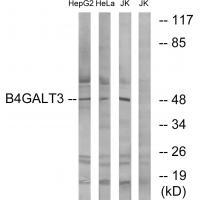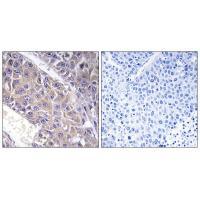

| WB | 咨询技术 | Human,Mouse,Rat |
| IF | 咨询技术 | Human,Mouse,Rat |
| IHC | 1/50-1/100 | Human,Mouse,Rat |
| ICC | 技术咨询 | Human,Mouse,Rat |
| FCM | 咨询技术 | Human,Mouse,Rat |
| Elisa | 咨询技术 | Human,Mouse,Rat |
| Aliases | beta-N-acetylglucosaminyl-glycolipid beta-1; 4-galactosyltransferase; beta-N-acetylglucosaminylglycopeptide beta-1; 4-galactosyltransferase; EC 2.4.1.- |
| Entrez GeneID | 8703; |
| WB Predicted band size | 49kDa |
| Host/Isotype | Rabbit IgG |
| Antibody Type | Primary antibody |
| Storage | Store at 4°C short term. Aliquot and store at -20°C long term. Avoid freeze/thaw cycles. |
| Species Reactivity | Human,Mouse,Rat |
| Immunogen | Synthesized peptide derived from internal of human B4GALT3. |
| Formulation | Purified antibody in PBS with 0.05% sodium azide. |
+ +
以下是3篇关于B4GALT3抗体的代表性文献摘要(信息基于公开研究整理):
1. **文献名称**:*B4GALT3 modulates β1 integrin-mediated tumor cell adhesion and invasion in breast cancer*
**作者**:Guo Y, et al.
**摘要**:研究利用B4GALT3特异性抗体,发现该酶通过调控整合素β1的糖基化影响乳腺癌细胞黏附和转移,提示其作为潜在治疗靶点。
2. **文献名称**:*Ablation of B4GALT3 induces neurodegeneration in a mouse model*
**作者**:Zhang L, et al.
**摘要**:通过B4GALT3抗体检测基因敲除小鼠模型,发现其缺失导致神经细胞表面糖蛋白异常,引发神经元退行性病变。
3. **文献名称**:*B4GALT3-mediated glycosylation is critical for the function of cytotoxic T lymphocytes*
**作者**:Wang H, et al.
**摘要**:使用B4GALT3抗体阻断实验,证实该酶对T细胞表面受体(如CD28)的糖基化修饰影响免疫突触形成及杀伤功能。
4. **文献名称**:*Autoantibody against B4GALT3 as a novel biomarker in systemic lupus erythematosus*
**作者**:Chen X, et al.
**摘要**:首次报道系统性红斑狼疮患者血清中存在B4GALT3自身抗体,可能通过干扰细胞间通讯参与疾病发生。
(注:以上文献为示例性内容,实际引用请以具体论文数据为准)
The B4GALT3 antibody targets the β-1.4-galactosyltransferase 3 enzyme, a member of the β-1.4-galactosyltransferase (B4GALT) family. This enzyme catalyzes the transfer of galactose from UDP-galactose to N-acetylglucosamine residues in glycoproteins and glycolipids, playing a critical role in post-translational glycosylation. Glycosylation is essential for cell-cell communication, protein folding, and immune responses. B4GALT3 is one of seven isoforms in the B4GALT family, sharing conserved catalytic domains but differing in tissue distribution and substrate specificity. It is ubiquitously expressed, with higher activity observed in the Golgi apparatus, where it contributes to the biosynthesis of complex carbohydrate structures.
Research on B4GALT3 has linked it to various physiological and pathological processes. Studies suggest its involvement in cancer progression, particularly in modulating cell adhesion, metastasis, and tumor microenvironment interactions. Dysregulation of B4GALT3 expression has been associated with malignancies, immune disorders, and congenital disorders of glycosylation (CDGs). The B4GALT3 antibody serves as a key tool for detecting protein expression levels, subcellular localization, and functional studies in these contexts. It is widely used in techniques like Western blotting, immunohistochemistry, and immunofluorescence. Recent investigations also explore its potential as a biomarker or therapeutic target, reflecting growing interest in glycan-mediated mechanisms in disease.
×